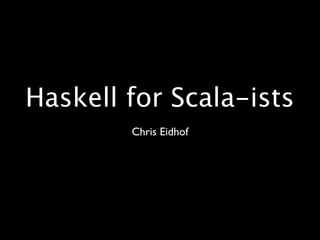
Haskell for Scala-ists
- 1. Haskell for Scala-ists Chris Eidhof
- 2. Three things • Datatypes • Purity • Laziness
- 3. List • data [a] = [] | a : [a]
- 4. List • data [a] = [] | a : [a] Type
- 5. List Type-parameter • data [a] = [] | a : [a] Type
- 6. List Type-parameter • data [a] = [] | a : [a] Type Constructor
- 7. List Type-parameter • data [a] = [] | a : [a] Case distinction Type Constructor
- 8. List Type-parameter Constructor • data [a] = [] | a : [a] Case distinction Type Constructor
- 9. Functions • reverse :: [a] -> [a] • reverse [] = [] • reverse (x:xs) = reverse xs ++ [x]
- 10. Functions Give me a list of a • reverse :: [a] -> [a] • reverse [] = [] • reverse (x:xs) = reverse xs ++ [x]
- 11. Functions Give me a list of a And I’ll return a list of a • reverse :: [a] -> [a] • reverse [] = [] • reverse (x:xs) = reverse xs ++ [x]
- 12. Functions Give me a list of a And I’ll return a list of a • reverse :: [a] -> [a] • reverse [] = [] • reverse (x:xs) = reverse xs ++ [x] Pattern Matching
- 13. Purity • State = Evil
- 14. Purity • Same Input • = • Same output
- 15. Purity • Same Input • ntial Refere cy Transp aren = • Same output
- 16. Purity • No side effects: • * Variables / Mutable state • * I/O • * launchMissiles()
- 17. Example • sort :: [Int] -> [Int] How do we know sort doesn’t launch missiles?
- 18. Doing I/O • putStrLn :: String -> IO ()
- 19. Doing I/O • putStrLn :: String -> IO () The IO type shows us it’s not pure
- 20. Doing I/O (>>=) :: IO a -> (a -> IO b) -> IO b main = putStrLn "hello! what's your name?" >>= () -> getLine >>= name -> putStrLn ("hello, " ++ name)
- 21. Doing I/O (>>=) :: IO a -> (a -> IO b) -> IO b main = putStrLn "hello! what's your name?" >>= () -> getLine >>= name -> putStrLn ("hello, " ++ name)
- 22. Doing I/O main = do putStrLn "hello! what's your name?" name <- getLine putStrLn ("hello, " ++ name)
- 23. Fusion • myFunction = map square . map toInt
- 24. Fusion • myFunction = map square . map toInt • = map (square . toInt)
- 25. Quickcheck • Automatic testing of pure code.
- 26. Parallel code • map :: (a -> b) -> [a] -> [b] • parMap :: (a -> b) -> [a] -> [b]
- 27. Composability • Pure code is easy to compose, it is • * Stateless • * Self-contained
- 28. Effects Useful Most languages Haskell Useless Dangerous Safe Simon Peyton-Jones, Caging The Effects Monster
- 29. Effects Useful Most Nirvana languages Haskell Useless Dangerous Safe Simon Peyton-Jones, Caging The Effects Monster
- 30. Effects Useful Most Nirvana languages Haskell Useless Dangerous Safe Simon Peyton-Jones, Caging The Effects Monster
- 31. Laziness • if (x < 10 && x > 5)
- 32. Laziness: Quicksort qsort [] = [] qsort (x:xs) = qsort (filter (< x) xs) ++ [x] ++ qsort (filter (>= x) xs) minimum ls = head (quickSort ls)
- 33. Laziness: Quicksort qsort [] = [] qsort (x:xs) = qsort (filter (< x) xs) ++ [x] ++ qsort (filter (>= x) xs) minimum ls = head (quickSort ls)
- 34. Read more • Real World Haskell - http://book.realworldhaskell.org/ • Haskell.org - http://haskell.org • Haskell Café - http://haskell.org/haskellwiki/Mailing_lists • Planet Haskell - http://planet.haskell.org/ • Haskell reddit - http://haskell.reddit.com •
- 35. Getting Started • 1. Install the Haskell Platform • http://hackage.haskell.org/platform/ • 2. Haskell in 10 minutes • http://haskell.org/haskellwiki/ Learn_Haskell_in_10_minutes
- 36. Keep in touch • http://github.com/chriseidhof • @chriseidhof